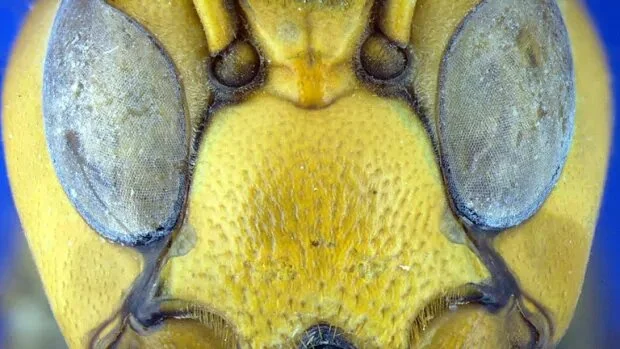A large invasive hornet is waking up for spring, and experts say a few of the bee-eating predators may soon be buzzing around B.C.
Last fall, a beekeeper in the northwest corner of Washington state found hives decimated by what American media is dubbing the murder hornet.
But B.C. bee experts, while concerned, don’t expect swarms of Asian giant hornets this summer and say the threat is minimal and no reason to stay inside.
Fierce but few
In August of 2019, the first ever hive of these hornets, which are actually named Vespa mandarinia, turned up in Nanaimo. In September, the nest was tracked to a spot in the ground in the Robin’s Park area, and beekeepers used dry ice to clear it out and collect specimens to study.

The world’s biggest hornet decapitates bees with jagged mandibles and devours them, leaving a pile of bodies. Worse yet, the hornet’s powerful venom is responsible for dozens of human deaths in Asia every year.
Despite this, B.C.’s top bee experts say the nickname is sensationalistic, unless perhaps you are a bee.
“It’s a very formidable character. They are very fierce but very few. They are not overrunning the landscape out here. That is simply not going to happen,” said provincial apiculturist Paul van Westendorp.
He doesn’t advocate panic and suggests people leave the hornets alone.
“These hornets are not interested in us, but they can cause quite a bit of problems if their nests are disturbed,” he said.
The Nanaimo nest of about 200 hornets was destroyed. A single hornet showed up in White Rock last November. A few weeks later, two individual hornets were found in Blaine, Wash.
“That strongly suggested there was a nest,” said van Westendorp.
He said scientists are working hard to make sure the hornet — or its sister species, an impressive six-centimetre queen that showed up in a North Vancouver office last May — do not establish in B.C.
The hornets are considered apex predators, but their population is sparse, and scientists say none are alive in B.C. that we know of right now.
Gail Wallin is executive director of the Invasive Species Council of B.C. She said new anecdotal reports of the hornets south of the border are a concern.
“If they’ve over-wintered, then it’s important that those nests be eradicated right away. These hornets certainly are a threat to the bee population,” she said.
Honeybees, the rusty-patched bumble bee and more than 800 other wild bee species are endangered in Canada.
The hornet’s sting has proven fatal in rare cases.
“They are a health concern because they have a powerful sting … and they are not something you’d want to be bitten by more than once or twice,” said Wallin.
In Asia, a few dozens deaths each year are attributed to the hornet, most often if a nest is disturbed, said van Westerndorp.
If a nest is disturbed, a colony will initially send out one hornet, then more, but only if the intruder remains there. A giant Asian hornet can sting repeatedly and the insect’s venom is nasty. It can cause an allergic reaction in some people.

In rare cases, the sting wound can become necrotic. People who have been stung liken the pain to a red hot pushpin being stabbed into their flesh, from the up-to-10 millimetre stinger.
Stop calling it a murder hornet, says bee expert
There is a risk if a person is allergic, but the venom is not the same as a bee’s venom.
Despite this, van Westendorp says that dubbing it the murder hornet is sensationalizing — unless you are a bee.
“Well, anybody who is naming it the “murder hornet,” I mean for heaven sakes,” he said.
But he is asking people, especially bee keepers, to be vigilant about odd-looking insects and hornets that may not be that large this time of year.
He says people who find unusual insects can report them and send a photograph, even though he laughs at some of the creatures he’s seen from people fearing invasive intruders — including at one point, a harmless stink bug.
He urges people not to destroy the body of the insect, if possible, as it can reveal a lot, if he gets it intact.
He says any sighting of an Asian giant hornet should be reported to the Invasive Species Council of B.C. at 1-888-933-3722.

Source link


Be First to Comment